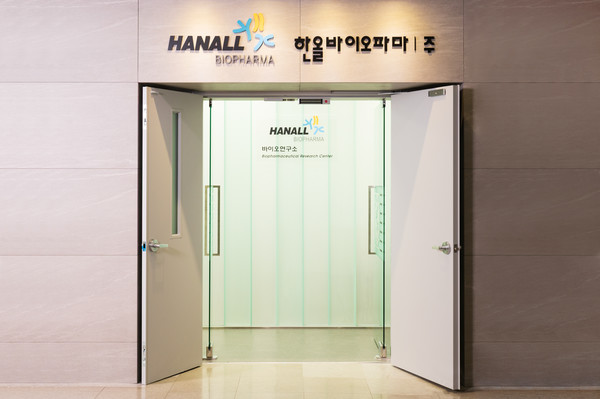Starts open collaboration with partner firms: CEO
Hanall Biopharma is one of the most frequently mentioned Korean drugmakers when analysts forecast the arrival of a global blockbuster drug. In developing autoimmune disease treatment candidate HL161(batoclimab), there are many ongoing clinical trials of batoclimab by partners in the U.S. and China to secure six indications.
The company is also working on HL036(tanfanercept) to make it the world’s first biologic drug for dry eye treatment.

Then, when can the company commercialize the two investigational drugs, and what are the company’s strategies for the global market? Korea Biomedical Review met with Jeong Seung-won, co-CEO of Hanall Biopharma handling worldwide R&D and innovation strategy, to learn about the company’s current status and future strategy.
“Hanall Biopharma has tried various attempts developing biologic drugs, and it also has experienced failure. The company has been pursuing, and will continue to pursue, an attitude to take the path that others had not, and have an attitude of not being afraid of failure and use it as an opportunity to learn.”
So said Jeong, who is in charge of worldwide R&D and open innovation, during an interview with Korea Biomedical Review.
Hanall Biopharma is aggressively developing dry eye disease treatment HL036 to sell them in the global market. Recently, the company started an open collaboration with Daewoong Pharmaceutical, a major Korean drugmaker.
In July, Hanall Biopharma and Daewoong participated in Series A investment in Nurron Pharmaceuticals, a U.S. biotech firm. In August, both companies invested $1 million in Boston-based Alloplex Biotherapeutics to find new immunotherapy.
For a Korean company, Hanall’s active investment is rare.
Jeong said Hanall Biopharma’s open collaboration has just started. “From now on, cooperation activities will increase exponentially,” he added.
Hanall Biopharma's R&D culture is to create the best results with internal and external experts, Jeong explained.
The company wants to not only develop new drugs by discovering and developing them internally, but also work with outside companies and experts to find new drug candidates with high potential at the same time, he said.
“With an open attitude, we will make an innovative medicine with multinational companies and scientists,” he said. “Whether the company is located in Korea or overseas, we can work with any company if it has the same vision that we pursue.”
‘If you try to avoid failure, you can’t try anything new’
Hanall Biopharma’s partnerships with other companies are in line with the company’s pipeline diversification strategy.
The company is focusing on therapeutic areas of immunology, ophthalmology, and immuno-oncology and plans to enter neurology, too.
Jeong accumulated experience in neurology when he worked for Novartis and UCB.
“We will build a robust pipeline. But, to do so, we have to commercialize one or two drugs in five years and make them directly accessible to patients,” he said.
Also, he added that three to four new drug candidates had entered global trials, and the company aims to conduct five to six pre-clinical projects soon.
Revenue growth is not the only reason why Hanall is actively securing pipelines.
Jeong said Hanall sought open collaboration with various companies to discuss multiple aspects to develop a drug and help patients.
Not only Hanall Biopharma but all domestic drugmakers need patient-oriented thinking to sell homegrown medicines in the global market, Jeong said.
He said that Korean companies commonly use the term “social responsibility,” but the word implies that it is not an essential part of their business.
However, pharmaceutical and biotech companies should come to realize that all their activities should be patient-oriented, he emphasized.
Also, blaming employees for a failure is an attitude that pharmaceutical and biotech companies should be most wary of, he went on to say.
Jeong repeatedly stressed the value and importance of failure in developing innovative new medicines.
He said that companies should be more “tolerant” of failures and try to learn from them, and this is the essence of innovation.
“If you try to avoid mistakes and failures, you won’t be able to try anything new,” Jeong said. “Any trial can fail. What’s different between a company prepared and a company that is not is how the company overcomes the failure.”
Asked what kind of company Hanall Biopharma wants to be, Jeong wished it could be a “globally respected” biotech company.
Industry watchers pay attention to how the company will turn the previous failures into the basis of success.

